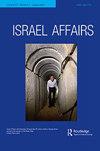The making of an alliance: the origins and development of the US–Israel relationship
IF 0.6
4区 社会学
Q3 AREA STUDIES
引用次数: 0
Abstract
echoes in major respects the accounts of other prominent historians. He traces in meticulous (and often excruciating) detail the path taken by the conflict, from its beginnings in the Galilee to its climax in Judea to its close in perhaps the most ‘celebrated’ single event of the fighting, the Roman siege of the mountain fortress of Masada. Nor does Rogers’ account depart noticeably in major respects from these other accounts in regard to the outcome of the revolt, particularly insofar as concerns the replacement of a ‘temple-centric’ Judaism by a ‘text-centric’ Judaism. He does part company with his peers, however, when it comes to speculating about the inevitability of the revolt’s course and consequences. Many of his colleagues strongly imply, if they do not say so explicitly, that the Jewish rebels had no chance of victory against the Roman Empire, that their cause was doomed from the very start. Rogers contends, to the contrary, that the rebels might well have achieved a measure of success in the revolt – in the form of enhanced autonomy for Judea, though probably not genuine independence from Rome – had they been better at strategy, tactics and logistics. The rebels, he correctly observes, never had a coherent and effective plan for confronting the Roman Empire, whilst the empire surely did have such a plan for confronting them. Regardless of whether one agrees with what is certain to be a controversial view, Rogers’ account of the first (but not the last) cataclysmic Roman–Jewish war offers superb insight into a fateful conflict, not only for Romans and Jews but also for the entire world. His book is most heartily recommended to anyone, scholar and layperson alike, who has an interest in the troubled relationship between the Roman Empire and the Jewish people.联盟的建立:美以关系的起源和发展
他在很多方面与其他著名历史学家的论述相呼应。从加利利的开始,到犹太的高潮,再到这场战斗中最“著名”的事件——罗马人对马萨达山要塞的围攻——的结束,他一丝不动地(常常是令人痛苦的)追溯了这场冲突所走过的道路。罗杰斯的描述在主要方面也没有明显地偏离其他关于起义结果的描述,特别是在“以圣殿为中心”的犹太教被“以文本为中心”的犹太教所取代的问题上。然而,当谈到对起义进程和后果的必然性的猜测时,他确实与他的同行意见相左。他的许多同事强烈暗示,即使他们没有明确地说出来,犹太叛军也没有机会战胜罗马帝国,他们的事业从一开始就注定要失败。罗杰斯认为,与此相反,如果起义军在战略、战术和后勤方面做得更好,他们很可能已经在起义中取得了一定程度的成功——以增强朱迪亚自治权的形式,尽管可能还没有真正从罗马独立出来。他正确地观察到,反叛者从来没有一个连贯有效的计划来对抗罗马帝国,而帝国肯定有这样一个计划来对抗他们。不管一个人是否同意这个肯定会引起争议的观点,罗杰斯对第一场(但不是最后一场)罗马-犹太灾难性战争的描述,不仅对罗马人和犹太人,而且对整个世界,都提供了对这场致命冲突的深刻见解。他的书是最衷心推荐给任何人,学者和外行一样,谁对罗马帝国和犹太人之间的麻烦关系感兴趣。
本文章由计算机程序翻译,如有差异,请以英文原文为准。
求助全文
约1分钟内获得全文
求助全文
来源期刊

Israel Affairs
AREA STUDIES-
CiteScore
0.70
自引率
25.00%
发文量
65
期刊介绍:
Whether your major interest is Israeli history or politics, literature or art, strategic affairs or economics, the Arab-Israeli conflict or Israel-diaspora relations, you will find articles and reviews that are incisive and contain even-handed analysis of the country and its problems in every issue of Israel Affairs, an international multidisciplinary journal. Scholarly and authoritative, yet straightforward and accessible, Israel Affairs aims to serve as a means of communication between the various communities interested in Israel: academics, policy-makers, practitioners, journalists and the informed public.
 求助内容:
求助内容: 应助结果提醒方式:
应助结果提醒方式:


